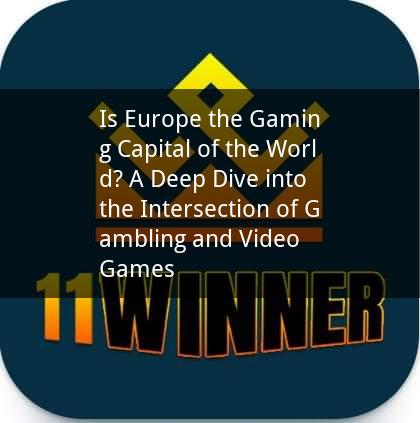
Table of Contents
1. The Evolution of Gaming in Europe
2. The Rise of Online Gambling in Europe
3. The Unique Role of Video Games in European Gambling
4. Comparative Analysis: Traditional Gambling vs. Video Game Gambling
5. Cultural Impact: Europe's Love for Gaming and Gambling
6. Legal Landscape: Navigating the European Gaming Market
7. Innovative Trends: Augmented Reality and Virtual Reality in European Gambling
8. The Social Aspect: Communities and Competitions
9. Challenges and Concerns: Addiction and Responsible Gaming
10. Conclusion: Europe's Gaming and Gambling Nexus
---
1. The Evolution of Gaming in Europe
Europe has been a fertile ground for the evolution of gaming. From the arcade halls of the 1970s to the sophisticated online platforms of today, the continent has witnessed a remarkable transformation. The early days of gaming were marked by classic arcade games like "Pong" and "Space Invaders," which captivated audiences across Europe. These games laid the foundation for a culture that would soon embrace digital entertainment on a massive scale.
2. The Rise of Online Gambling in Europe
The late 1990s saw the emergence of online gambling, and Europe was at the forefront of this revolution. With the advent of the internet, European countries began to establish regulatory frameworks to oversee the burgeoning online gambling industry. The UK, in particular, became a hub for online casinos and sports betting sites, drawing players from across the globe.
3. The Unique Role of Video Games in European Gambling
While traditional forms of gambling such as casinos and betting shops remain popular, video games have carved out a unique niche within the European gambling landscape. Video game gambling, often referred to as "skill gaming," involves playing games for money, combining the thrill of gaming with the potential for financial gain.
4. Comparative Analysis: Traditional Gambling vs. Video Game Gambling
Traditional gambling, with its physical locations and tangible outcomes, often lacks the interactive and immersive experience that video game gambling offers. Video games provide a virtual environment where players can engage with complex storylines, characters, and gameplay mechanics, creating a more engaging and dynamic experience.
5. Cultural Impact: Europe's Love for Gaming and Gambling
Europe's love for gaming and gambling is deeply rooted in its cultural fabric. From the vibrant gaming scenes in countries like the Netherlands and Sweden to the historic gambling cities of Monte Carlo and Las Vegas (which, although not in Europe, are often associated with the continent), there is a palpable sense of excitement and enthusiasm for both activities.
6. Legal Landscape: Navigating the European Gaming Market
The European gaming market is complex, with each country having its own set of regulations. While some countries have embraced online gambling and video game gambling with open arms, others have imposed strict restrictions. The UK, for instance, has a liberal approach, while France has been more cautious.
7. Innovative Trends: Augmented Reality and Virtual Reality in European Gambling
The integration of augmented reality (AR) and virtual reality (VR) into the gaming and gambling experience is reshaping the industry. In Europe, these technologies are being used to create more immersive and realistic gaming environments, attracting a new generation of players.
8. The Social Aspect: Communities and Competitions
The social aspect of gaming and gambling is undeniable. In Europe, gaming communities are as vibrant as ever, with players coming together to compete, share strategies, and simply enjoy each other's company. Online platforms like Twitch and Discord have become hubs for gaming enthusiasts.
9. Challenges and Concerns: Addiction and Responsible Gaming
Despite the excitement and entertainment value, there are significant challenges and concerns associated with gaming and gambling. Addiction is a major issue, with some individuals struggling to control their gaming and gambling habits. Responsible gaming initiatives are being implemented across Europe to address these concerns.
10. Conclusion: Europe's Gaming and Gambling Nexus
The intersection of gaming and gambling in Europe is a complex and dynamic one. As technology continues to evolve, so too will the gaming and gambling industries. Europe's role as a leader in these sectors is undeniable, and its impact on the global market will only grow in the years to come.
---
Questions and Answers
1. Q: How has the online gambling industry in Europe influenced the gaming landscape?
A: The online gambling industry has significantly influenced the gaming landscape by integrating gambling elements into video games, creating a new form of entertainment that combines the thrill of gaming with the potential for financial gain.
2. Q: What are the legal challenges faced by video game gambling in Europe?
A: The legal challenges include varying regulations across different countries, the need for clear definitions of what constitutes gambling, and ensuring compliance with anti-money laundering and age verification laws.
3. Q: How does the cultural perception of gambling differ between traditional and video game gambling in Europe?
A: Traditional gambling is often seen as a form of entertainment with a long history, while video game gambling is viewed as a more modern and interactive experience, sometimes with a stigma attached due to its association with gambling.
4. Q: What role do social media platforms play in the gaming and gambling communities in Europe?
A: Social media platforms serve as essential tools for community building, sharing content, and organizing events. They facilitate communication between players and provide a space for discussion and support.
5. Q: How are European countries addressing the issue of gambling addiction?
A: European countries are implementing various measures, including public awareness campaigns, self-exclusion programs, and responsible gaming policies to address gambling addiction and promote healthier gaming habits.